Charles E W Bean, Diaries, AWM38 3DRL 606/43/1 - April - May 1916 - Part 5
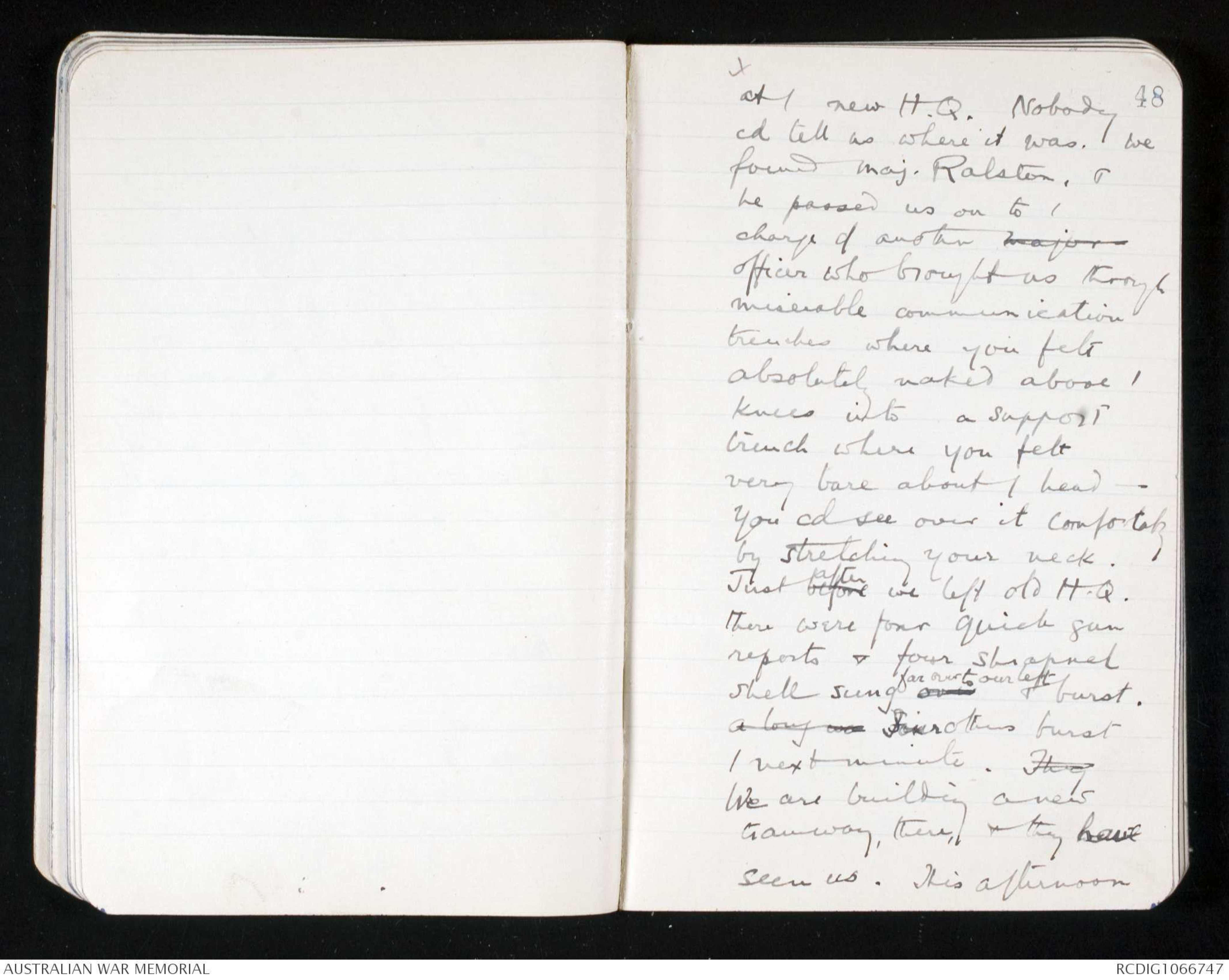
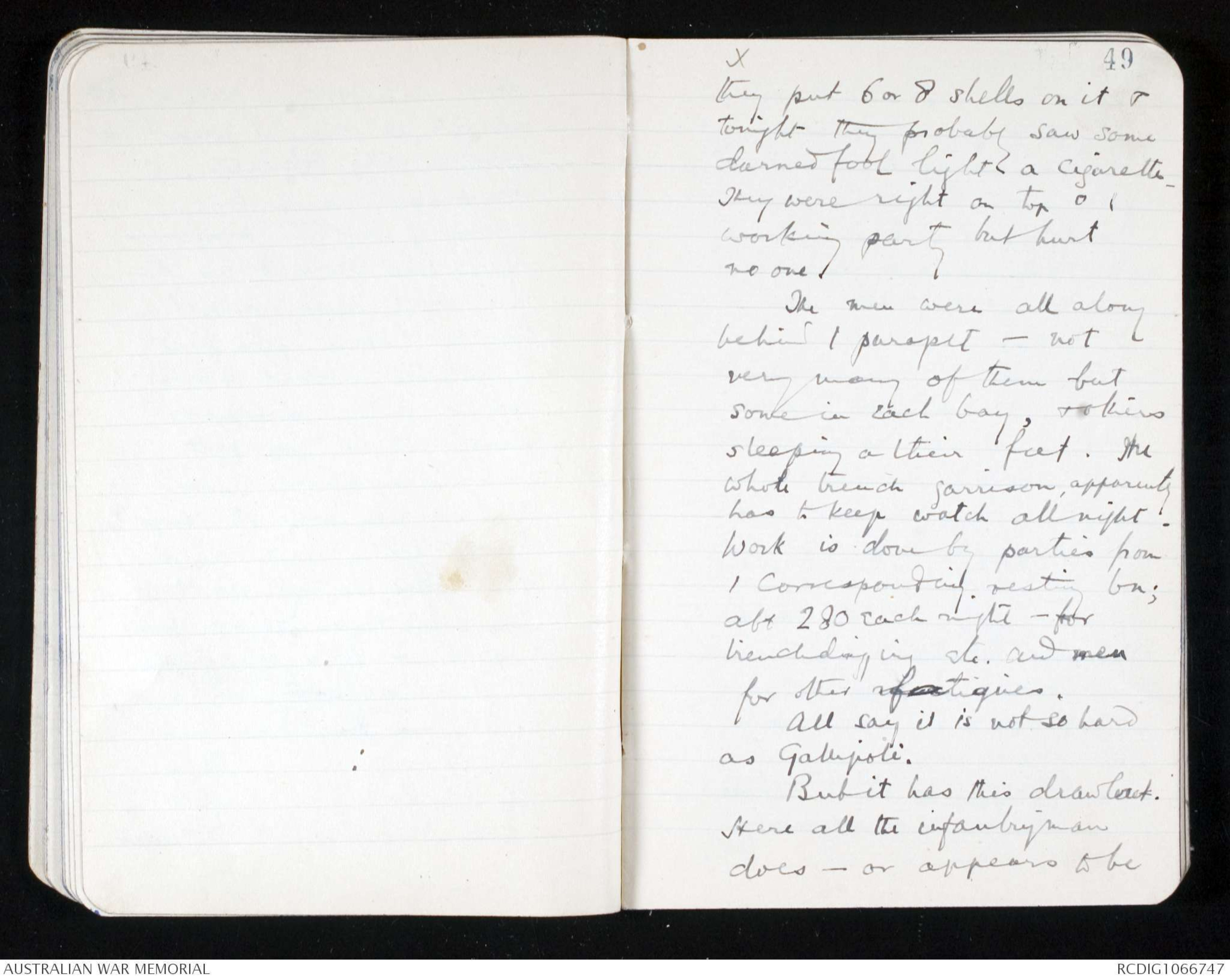
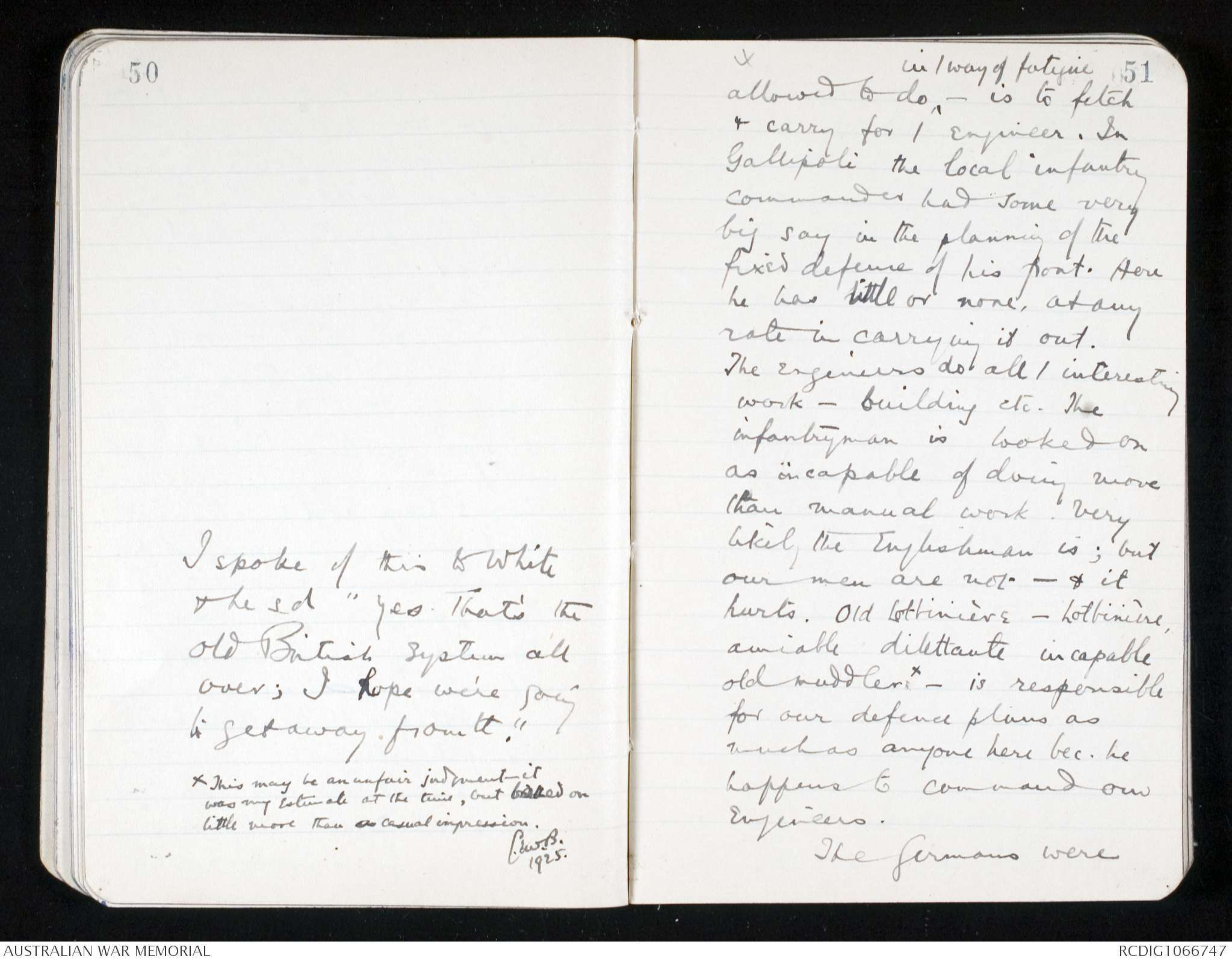
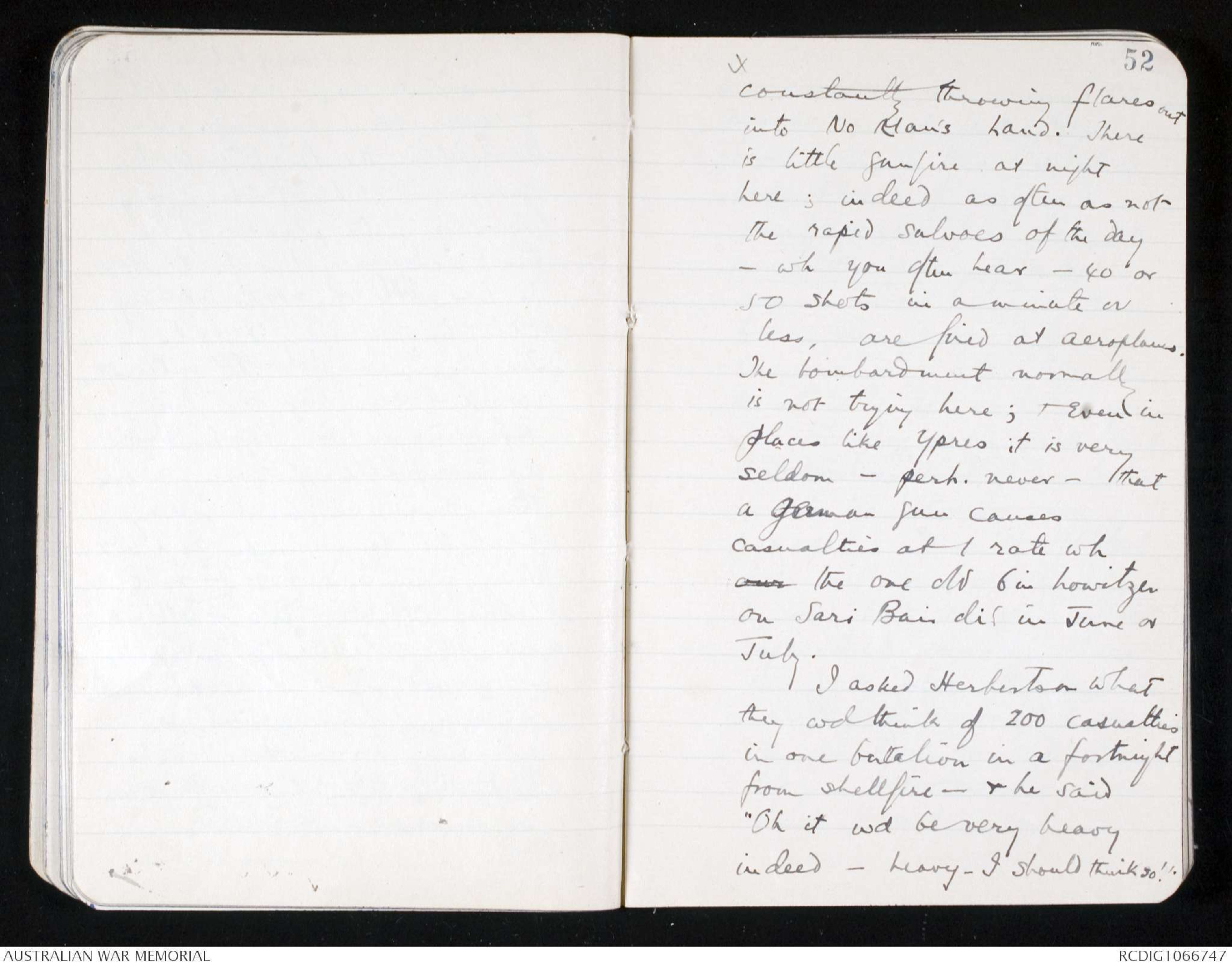
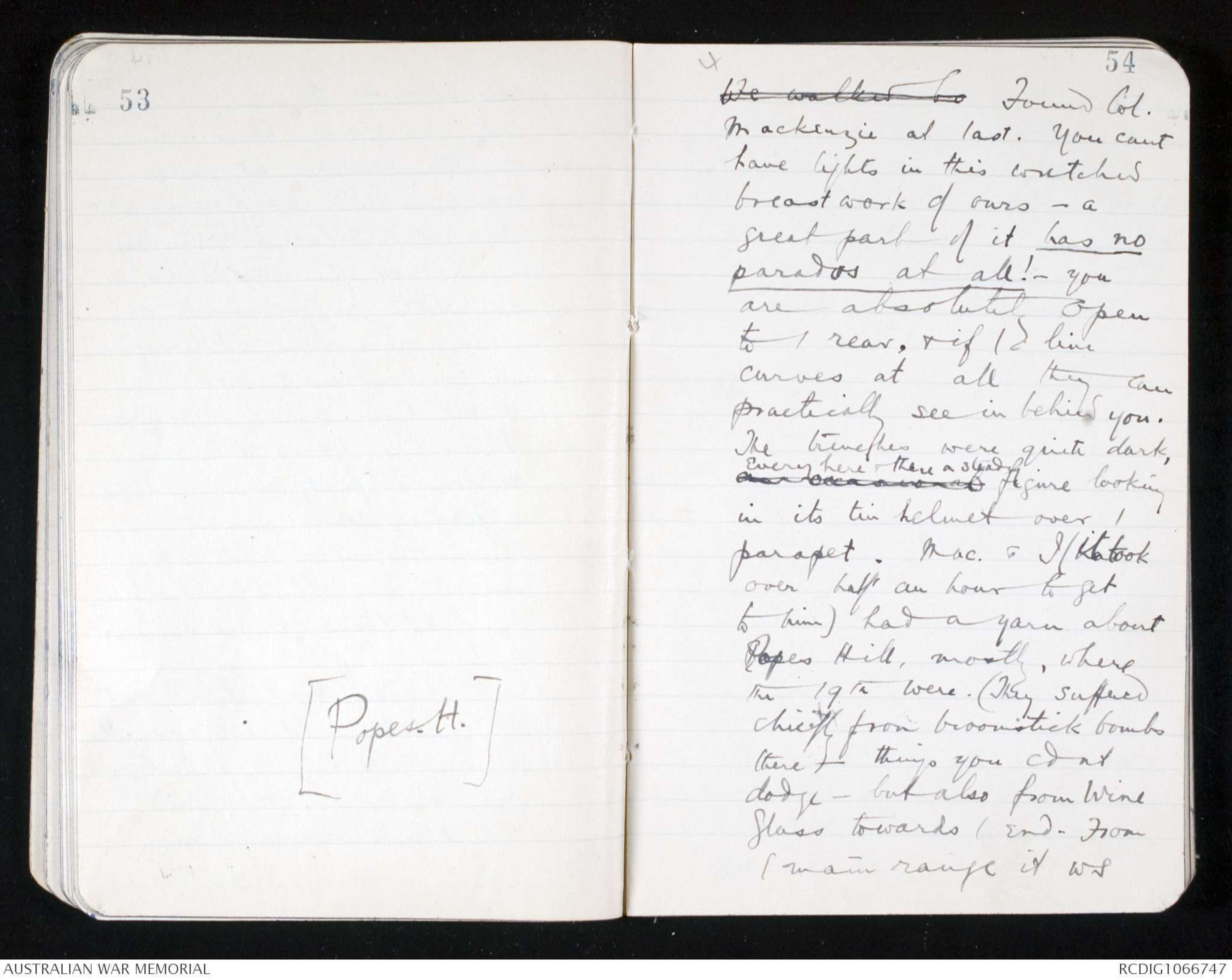
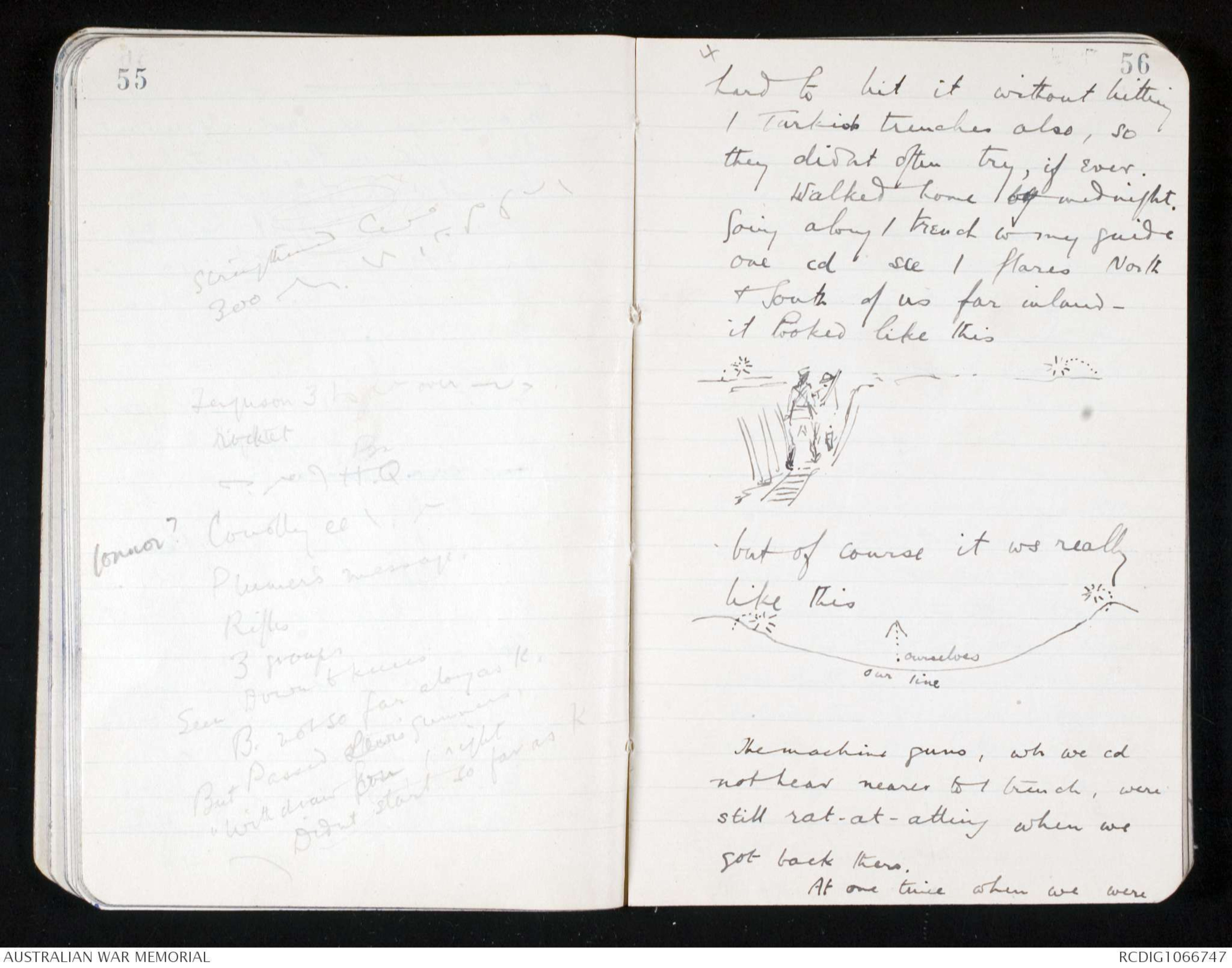
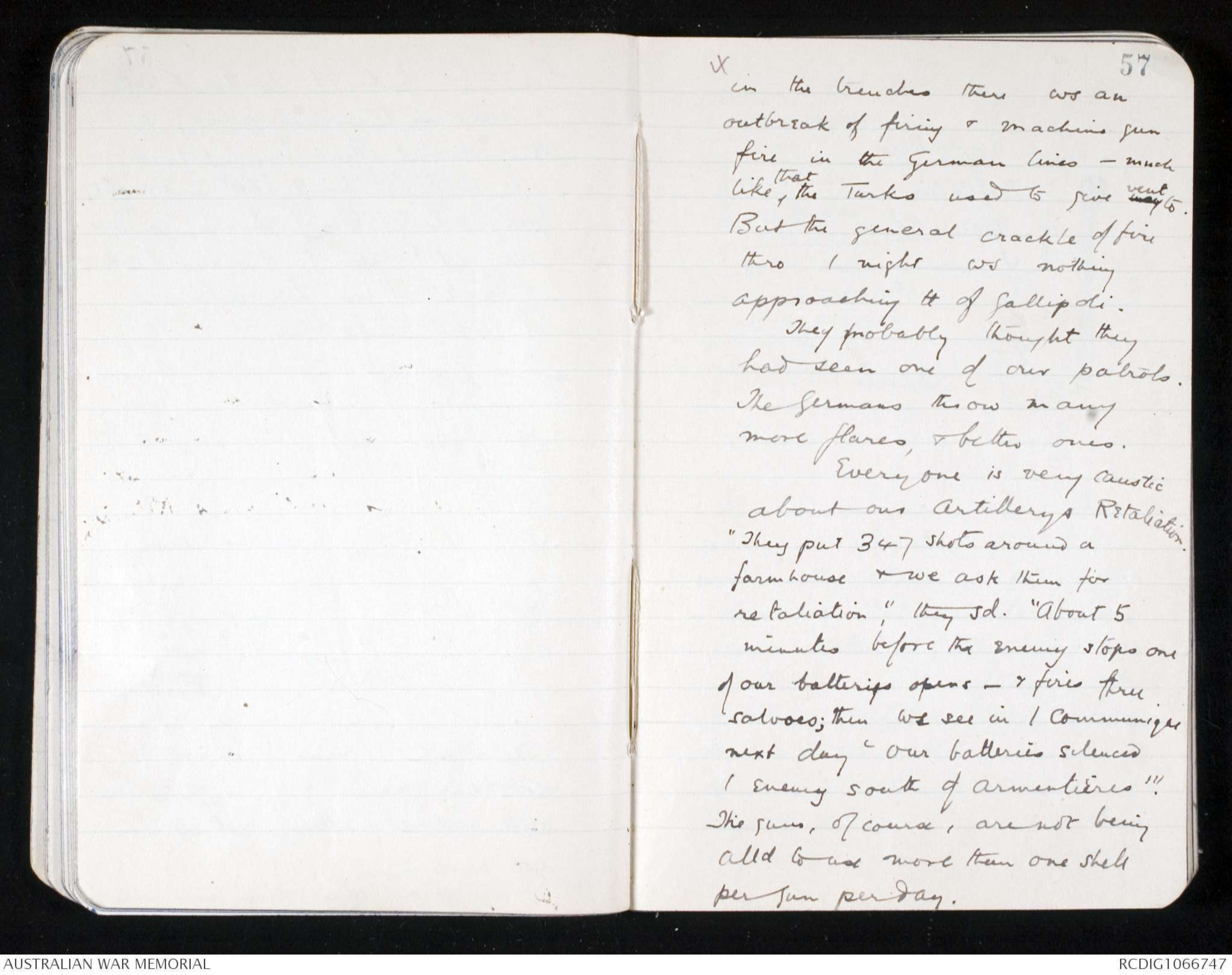
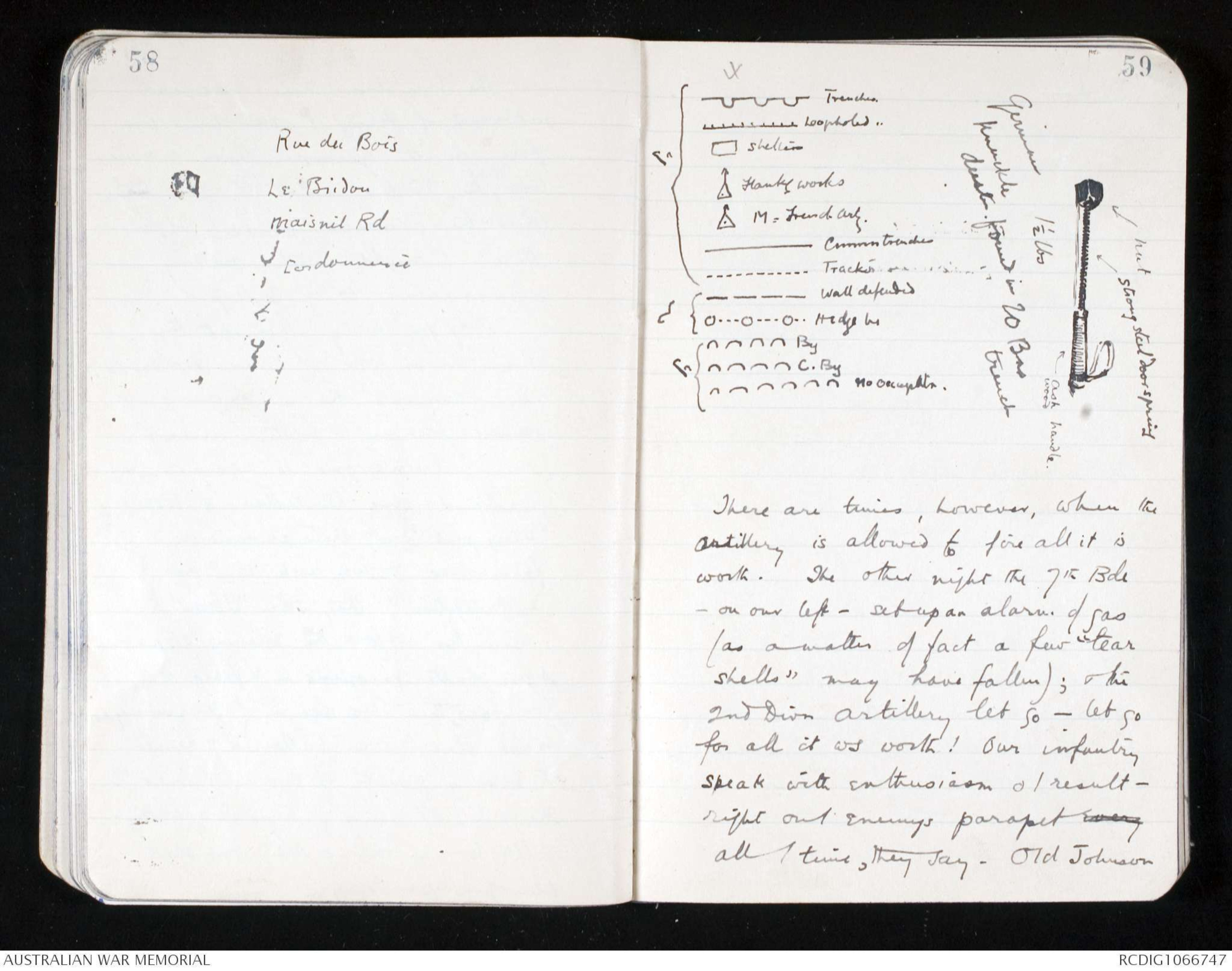
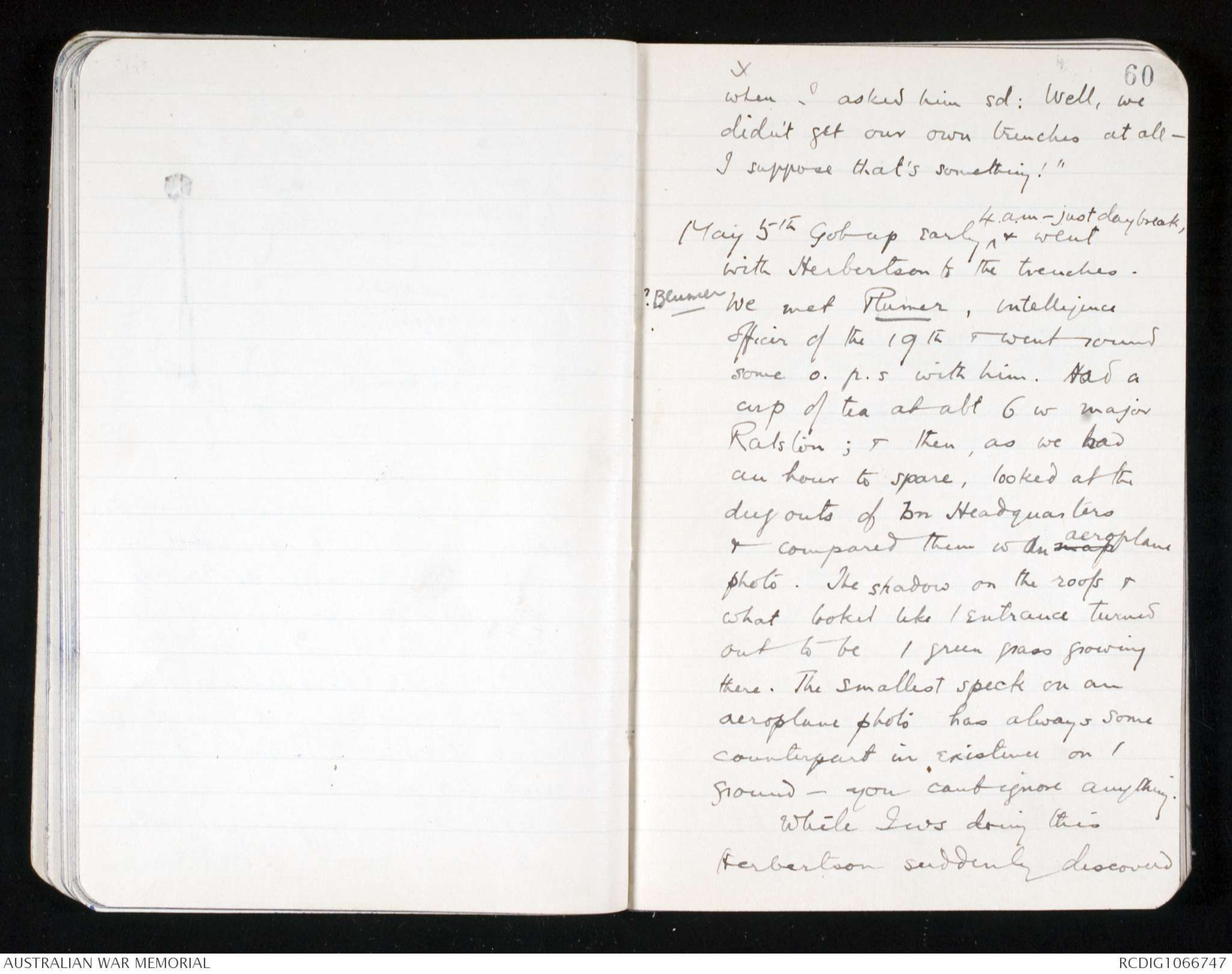
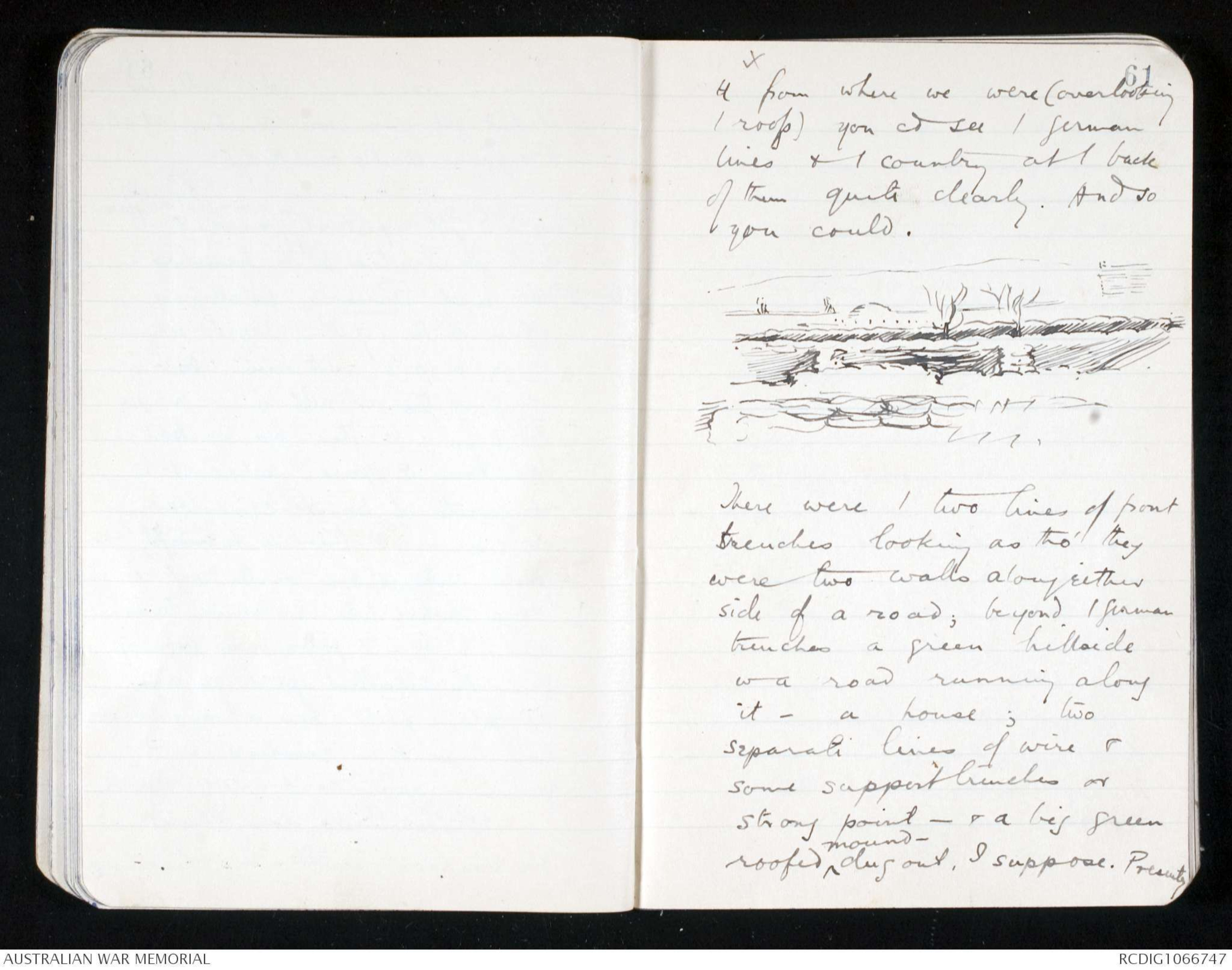
4 48
at / new H.Q. Nobody
cd tell us where it was. We
found Maj. Ralston, &
he passed us on to /
charge of another Major-
officer who brought us through
miserable communication
trenches where you felt
absolutely naked above /
knees into a support
trench where you felt
very bare about / head-
You cd see over it comfortably
by stretching your neck.
Just before after we left old H.Q.
there were four quick gun
reports & four shrapnel
shell sung over far over to our left & burst.Along wi over xxx others burst
/ next minute. They
We are building a new
tramway, there, & they have
seen us. This afternoon
4 49
X they put 6 or 8 shells on it &
tonight they probably saw some
darned fool light a cigarette.
They were right on top o /
working party but hurt
no one.
The men were all along
behind / parapet - not
very many of them but
some in each bay, & others
sleeping at their feet. The
whole trench garrison apparently
has to keep watch all night.
Work is done by parties from
/ corresponding resting bn;
about 280 each night - for
trench digging etc. and men
for other fatigues.
All say it is not so hard
as Gallipoli.
But it has this drawback
Here all the infantrymen
docs - or appears to be
50
*I spoke of this w White
& he sd " Yes, that's the
old British system all
over; I hope we're going
to get away from tt."
*This may be an unfair judgement- it
was my estimate at the time, but backed on
little more than casual impression.
CEWB.
1925
4 51
allowed to do ^ in / way of fatigue - is to fetch
and carry for / engineer. In
Gallipoli the local infantry
commander had some very
big say in the planning of the
fixed defence of his front. Here
he has little or none, at any
rate in carrying it out.
The engineers do all / interesting
work - building etc. The
infantryman is looked on
as incapable of doing more
than manual work. Very
likely the Englishman is; but
our men are not - & it
hurts, Old Lotbiniere - Lotbiniere,
amiable, dilettante incapable
old muddler x - is responsible
for our defence plans as
much as anyone here bec. he
happens to command our
engineers.
The Germans were
4 52
constantly throwing flares out
into No Man's Land. There
is little gunfire at night
here; indeed as often as not
the rapid salvoes of the day
- wh you often hear - 40 or
50 shots in a minute or
less, are fired at aeroplanes.
The bombardment normally
is not trying here; & even in
places like Ypres it is very
seldom - perh. never - that
a German gun causes
casualties at / rate which
our the one old 6 in howitzer
on Sari Bair did in June or
July.
I asked Herbertson what
they wd think of 200 casualties
in one battalion in a fortnight
from shellfire - and he said
"Oh it wd be very heavy
indeed - heavy - I should think so!!
53
[Popes. H. ]
4 54
We walked to Found Col.
Mackenzie at last. You can't
have lights in this wretched
breastwork of ours - a
great part of it has no
parados at all! - you
are absolutely open
to / rear, & if / line
curves at all they can
practically see in behind you.
The trenches were quite dark,
our occasional every here & there a steady figure looking
in its tin helmet over /
parapet. Mac. &I (it took
over half an our to get
to him) had a yarn about
Popes Hill, mostly, where
the 19th were. (They suffered
chiefly from broomstick bombs
there - things you cdn't
dodge - but also from Wine
Glass towards / end. From
/ main range it ws
55
Strengthened
[[shorthand]]
300
[[shorthand]]
Ferguson 3 [[shorthand]]
Rocket
[[shorthand]] from HQ
Connor? Connolly [[shorthand]]
Plummers message
Rifles
3 groups
Seen down to knees
B. not so far along as K.
But passed Lewis Gunners
"withdraw from / right
didn't start so far as K
4 56
hard to hit it without hitting
/ Turkish trenches also, so
they didn't often try, if ever
Walked home by midnight.
Going along / trench with my guide
one could see / flares North
& South of us far inland -
it looked like this
Diagram - see original document
but of course it was really like this
Diagram - see original document
The machine guns, wh we cd
not hear nearer to / trench, were
still rat-at-atting when we
got back there.
At one time when we were
4 57
in the trenches there ws an
outbreak of firing & machine gun
fire in the German lines - much
like ^ that the Turks used to give way vent to.
But the general crackle of fire
thro / night ws nothing
approaching tt of Gallipoli.
They probably thought they
had seen one of our patrols.
The Germans throw many
more flares, & better ones.
Everyone is very caustic
about our artillerys Retaliation.
"They put 347 shots around a
farmhouse & we ask them for
retaliation" they said. "About 5
minutes before the enemy stops one
of our batteries opens - & fires three
salvoes; then we see in / communique
next day 'Our batteries silenced
/ enemy south of Armentieres"
The guns, of course, are not being
called to use more than one shell
per gun per day.
58
Rue de Bois
Le Bridou
Maisnil Rd
Cordomnerice
4 59
Diagram - see original document
There are times, however, when the
artillery is allowed to fire all it is
worth. The other night the 7th Bde
on our left- set up an alarm. of gas
(as a matter of fact a few "tear
shells" may have fallen); & the
2nd Divn artillery let go - let go
for all it was worth! Our infantry
speak with enthusiasm o / result-
right on / enemys parapet every
all the time, they say. Old Johnson
4 60
when I asked him sd: Well, we
didn't get our own trenches at all -
I suppose that's something!"
May 5th Got up early ^ 4am-just daybreak, & went
with Herbertson to the trenches.
?Blumer We met Plumer, intelligence
officer of the 19th and went round
some o. p. s with him. Had a
cup of tea at about 6 w major
Ralston; & then as we had
an hour to spare, looked at the
dug outs of bn Headquarters
& compared them w an map aeroplane
photo. The shadows on the roofs &
what looked like / entrance turned
out to be / green grass growing
there. The smallest speck on an
aeroplane photo has always some
counterpart in existence on /
ground - you can't ignore anything.
While I was doing this
Herbertson suddenly discovered
4 61
tt from where we were (overlooking
/ roofs) you could see / German
lines and / country at / back
of them quite clearly. And so
you could.
Diagram - see original document
There were / two lines of front
trenches looking as tho' they
were two walls along either
side of a road; beyond / German
trenches a green hillside
w a road running along
it - a house; two
separate lines of wire and
some support trenches or
strong point - & a big green
roofed ^ mound dug out, I suppose. Presently
 Deb Parkinson
Deb ParkinsonThis transcription item is now locked to you for editing. To release the lock either Save your changes or Cancel.
This lock will be automatically released after 60 minutes of inactivity.